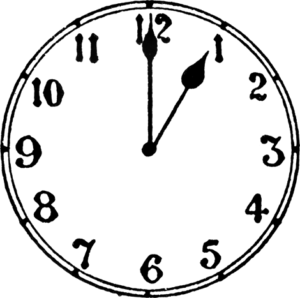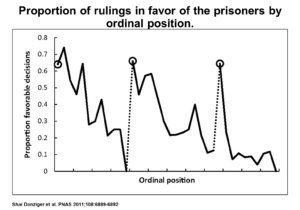It’s contract renewal time and you’re in a dogfight. Things haven’t gone well this year with your biggest customer and a competitor has a serious shot at displacing you. Can the time of day you ask for the order impact the outcome? Neuroscience says yes.
Judging by the clock
 We assume we make rational choices all the time and under any circumstances. This is especially true when it comes to judges, who we expect will always make impartial, fact-based decisions. But as researchers found in a study examining over a thousand parole hearings, favorable rulings dropped gradually from about 65% to nearly zero just before judges took their scheduled breaks.[1] After resuming the proceedings, positive outcomes jumped back up to 65% before gradually dropping off again. Results were independent of factors such as severity of the offense, months served, previous incarcerations, or prisoner demographics.
We assume we make rational choices all the time and under any circumstances. This is especially true when it comes to judges, who we expect will always make impartial, fact-based decisions. But as researchers found in a study examining over a thousand parole hearings, favorable rulings dropped gradually from about 65% to nearly zero just before judges took their scheduled breaks.[1] After resuming the proceedings, positive outcomes jumped back up to 65% before gradually dropping off again. Results were independent of factors such as severity of the offense, months served, previous incarcerations, or prisoner demographics.
This effect has been observed in other types of serial decisions as well. Why does this happen?
System overload
Neuroscientists say our brains operate with two different mechanisms: System 1 and System 2.[2] System 1 is our ancient subconscious, the product of millions of years of evolution. It’s automatic and lightning fast, but simple in operation. System 1 relies on emotion and intuition and applies simple rules when making decisions. System 2 is our conscious, reflective mind, the mechanism that makes us uniquely human. It works at a slower pace, integrating and processing information from many different neural circuits. It relies on logic and reason and is capable of making complex, nuanced decisions.
 Since System 2 is a relatively new from an evolutionary perspective, it has less total circuitry and is less efficient than System 1. As a result, it’s easily overloaded. Most people can’t keep more than four items in short-term memory, much less “multi-task,” contrary to popular belief. Our inability to consciously process more than one thing at a time is what makes magicians so successful in their craft.
Since System 2 is a relatively new from an evolutionary perspective, it has less total circuitry and is less efficient than System 1. As a result, it’s easily overloaded. Most people can’t keep more than four items in short-term memory, much less “multi-task,” contrary to popular belief. Our inability to consciously process more than one thing at a time is what makes magicians so successful in their craft.
Research has shown that making repeated judgments or serial decisions physically reduces System 2 function. High cognitive demand depletes blood glucose levels,[3] and as conditions change the brain adjusts how it makes decisions based on available metabolic resources.[4] This explains why judges change their rulings throughout the day. As they become “hangrier,” System 2 becomes overloaded and System 1 gradually steps in to simplify decisions. Consequently, closer to break time judges become more likely to accept the default, status quo outcome: deny a prisoner’s request.
Buy them lunch first
Executives are no different than judges. Their hectic days involve making myriad complex decisions, burning through glucose all the while. Like judges, business leaders increasingly rely on simple heuristics the closer it gets to lunchtime. And their subconscious “rules of thumb” may not always go in your favor.
So if your customer’s contract renewal could go either way, he or she will need full use of their System 2 resources. In these situations, customer trust is low, making them automatically revert to calculative commitment. Rather than make a quick decision, they must carefully weigh the benefits, costs and risks of staying put or switching to a competitor.
 To ensure your day in court is fair, you will need the executive’s brain to be rested and flush with glucose. Schedule your closing conversation first thing in the morning or right after lunch. Depending on the circumstances, getting on a plane and buying them lunch before asking for their signature may be justified. Besides the sugar rush, a handshake and a friendly face-to-face discussion immediately prior also causes the brain to release oxytocin, a hormone that makes people more open-minded and caring about others. At the end of the meal, conditions will be optimal for decision making, so have your pen ready.
To ensure your day in court is fair, you will need the executive’s brain to be rested and flush with glucose. Schedule your closing conversation first thing in the morning or right after lunch. Depending on the circumstances, getting on a plane and buying them lunch before asking for their signature may be justified. Besides the sugar rush, a handshake and a friendly face-to-face discussion immediately prior also causes the brain to release oxytocin, a hormone that makes people more open-minded and caring about others. At the end of the meal, conditions will be optimal for decision making, so have your pen ready.
… but don’t rely too much on your expense account
While the science suggests it works, relying on subtle biological advantages isn’t an effective or sustainable business strategy. Your best bet is always to proactively and systematically build trust throughout the customer’s experience. Ensuring customers achieve value, reach their goals, and build strong relationships along the way makes the purchase decision a “no-brainer,” regardless of the time of day.
Sources:
[1] Danziger, S., Levav, J., Avnaim-Pesso, L. (2011). Extraneous factors in judicial decisions. Proceedings of the National Academy of Sciences of the United States of America, vol. 108, no. 17
[2] Kahneman, D., and Frederick, S. (2002). Representativeness revisited: Attribute substitution in intuitive judgment. In T. Gilovich, D. Griffin, & D. Kahneman (Eds.), Heuristics and biases: The psychology of intuitive judgment (pp. 49-81) Cambridge University Press.
[3] Scholey, A., Harper, S. Kennedy, D. (2001) Cognitive demand and blood glucose. Psychology & Behavior, July 2001, Vol 73(4) 585-592
[4] 2015 Christie, S., Schrater, P. Cognitive cost as a dynamic allocation of energetic resources, Frontiers in Neuroscience.
